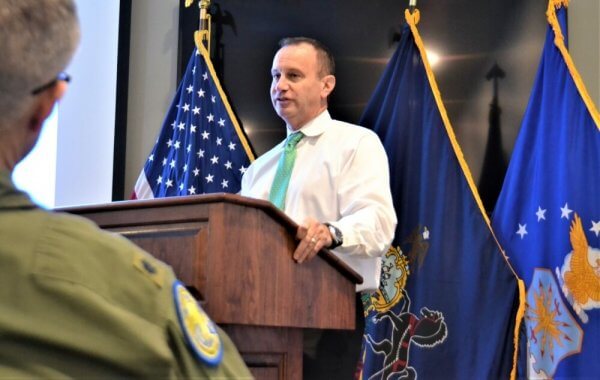Remaining ready to provide a full-spectrum of worldwide military operations requires sacrifice — sometimes of a basic need: Sleep.
The 111th Attack Wing at the Horsham Air Guard Station in Pennsylvania, host to a remotely-piloted aircraft (RPA) unit, conducts a 24/7 mission, requiring shift-work schedules in certain career fields. And like many other military members safeguarding the homeland, Guardsmen here may have a greater potential for developing sleep disorders.
According to Sleep Foundation, “Shift work disorder can be caused by night shifts, rotating shifts, or even an early morning shift. It can cause chronic sleep deprivation…This kind of chronic loss of sleep has serious implications for health, productivity and safety.”
Recognizing this, the 111th ATKW took a proactive approach to increase Airmen’s resiliency.
Sleep specialist speaks to airmen
Last month, Dr. Richard E. Friedenheim, Abington Pulmonary and Critical Care Associates Sleep Disorder Center medical director, spoke at the installation to an audience composed predominately of the 111th Operations Group members.
Friedenheim addressed common sleep disorders. Treating these disturbances is not only a measure to promote physical health; but it may also assist in mission accomplishment.
“People who are sleep deprived can perform like someone who is intoxicated,” said Friedenheim. “Performance on nerve-cognitive testing, driving tests and other simulations prove that both can be equally harmful, more than many might expect.”
It’s difficult to argue that a well-rested operator is likely to perform more effectively than if exhausted. Yet, sleep may be more elusive for those in fields requiring a heightened level of attention. This paradox can occur in the high-stress, high-stakes work of the RPA mission, Friedenheim said.
“My suspicion is that [some Wing members here] may have disjointed schedules; and so, the prevalence of sleep disorders among certain occupations here is high.”
Visible by the flurry of questions upon Friedenheim’s conclusion, his statement resonated with many in the audience.
A 103rd Attack Squadron technical sergeant, part of the 111th OG, asked Friedenheim, “I was wondering, how bad is shift work for your sleep quality?”
“Horrible,” answered Friedenehim. “But there are things you can do to counter the negatives.”
He continued by listing recommendations to counter unideal work-sleep cycles. Measures for those working nights include minimizing bright lights before and during sleep hours; wearing sunglasses for the post-shift commute; limiting stimulating and monitoring alcohol and nicotine consumption Also, he explained how to time napping and caffeine intake to correlate with healthy sleep hygiene.
Inquiries ranging from body position to medication followed, with audience members actively involved throughout the question-and-answer opportunity. The continuous flow of queries demonstrated the operations group’s acute interest in the subject of sleep.
But sleep disorders in shift-working Airmen isn’t a new theme.
Last year, the 363rd Intelligence, Surveillance and Reconnaissance Wing, Joint Base Langley-Eustis, Va., devoted an episode of their podcast, The Pillars, to the topic. In that resiliency-based audio, many of the recommendations discussed mirrored those of Freidman’s presentation.
“On our way over here to record, I was talking about the life of the shift worker,” said podcast host 363rd ISRW Chaplain (Maj.) Jim Bridgham, “Just going from the nights to the days…it really impacts your sleep and sleep quality. Sometimes you feel like you’re not rested throughout the day.”
Additionally, RAND Corp. conducted a study titled, Airman and Family Resilience, Lessons from the Scientific Literature. In the report, RAND offered research and recommendations to the Air Force to help strengthen the development resilience among Airmen, civilian employees and Air Force families. Sleep hygiene was noted in the final recommendations.
Despite the complications, shift work is inevitable in battling current global threats. And sleep disorders caused by these schedules may be a difficulty Wing members face in the profession of arms. But through 111th ATKW programs, the goal is to create and maintain a robust Air Guard force – by recognizing hardships, providing information and instilling hope.
“There’s anxiety; you do a very stressful job and that comes with a catch,” Friedenheim said, replying to a 103rd ATKS pilot. “…And treating [sleep disorders] is not like flicking a light switch, it can take time. But there’s hope at the end of the tunnel.”

